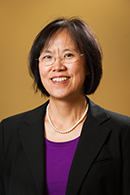National Academy of Inventors names Sun a fellow for her innovations, achievements
Wednesday, Dec. 12, 2018
MANHATTAN — The National Academy of Inventors is honoring Xiuzhi "Susan" Sun, university distinguished professor of grain science and industry and ancillary faculty of biological and agricultural engineering at Kansas State University, for her prolific spirit of innovation and the impact of her work.
Sun is one of 148 renowned academic inventors and innovators named as the newest fellows. The academy's more than 1,000 fellows represent more than 250 research universities and government and nonprofit research institutes. The 2018 fellows are named inventors on nearly 4,000 issued U.S. patents.
"I am honored to be named a fellow and thank my collaborators and students through the years for their contributions to my efforts," Sun said. "I feel so blessed to have the opportunities to discover something useful to humanity."
Sun brought her research expertise in bio-based materials engineering and discovery to Kansas State University in 1996. She is named on 15 U.S. patents that have generated more than $385,000 in licensing revenue via the Kansas State University Research Foundation.
"Dr. Sun is one of K-State's most prolific innovators," said Peter Dorhout, vice president for research at Kansas State University. "She works at the intersection of biology, chemistry and physics, and has demonstrated broad research interests and creativity in developing biodegradable plastics, plant-based adhesives and much more — and her work has had many practical applications."
Nine of Sun's patents have been licensed. Two of her most significant patents are for adhesives and coatings made from modified soy proteins and for novel hydrogels for biomedical applications. In 2015, Sun's hydrogel invention, called PepGel, was selected by the U.S. Patent and Trade Office for the Innovation Festival at the Smithsonian National Museum of American History. PepGel offers a medium in which researchers can grow cells in 3D or deliver drugs into the body. Its unique properties allow it to become a liquid under certain conditions then turn back into a gel.
Sun is currently working at the Wake Forest Institute for Regenerative Medicine during her sabbatical. She is hosted by Anthony Atala, professor and institute director, to explore the feasibility of PepGel in 3D bioprinting for organs.
"It is great to have a researcher of Susan's caliber here at the institute," Atala said. "PepGel is a unique hydrogel material and has great potential for 3D bioprinting without needing ultraviolet or chemical cross-linkers."
Sun has attracted about $20 million in grant funding from federal and state agencies and private industry. She co-authored one of the best-selling books in the field of chemical and biological and agricultural engineering, "Bio-based Polymers and Composites," which provided the first systematic description of the green engineering, chemistry and manufacture of bio-based polymers and composites derived from plants. She has authored 190 peer-reviewed journal articles and 14 book chapters, and she has delivered 87 invited seminars and many conference presentations. She also is the founder of two startup companies.
A member of numerous professional societies, Sun is a fellow of the American Society of Agricultural and Biological Engineers, and she received the Lifetime Achievement Award from the Bioenvironmental Polymer Society. Sun has served as associate editor of the Journal of Biobased Materials and Bioenergy since 2006, and she previously was associate editor of the Journal of Polymers and the Environment, Cereal Chemistry, and Transactions of the ASABE. Sun also was recognized as one of the "50 Kansans You Should Know" by Ingram's magazine in 2013, was named one of top scientists in the state's 150-year history by Ad Astra Kansas in 2011, and received the prestigious Higuchi-KU Endowment Research Award in Applied Sciences, also in 2011.
"The importance of Dr. Sun's contributions to her field stems from the fact that she applies fundamental knowledge, obtained from her research, to solve real-world problems and to develop new materials and products derived from biorenewable feedstocks that lessen dependence on petroleum-based chemicals," said Gordon Smith, professor and head of the department of grain science and industry and director of the International Grains Program Institute at Kansas State University.
Fellows must be named inventors on U.S. patents and nominated by their peers for outstanding contributions to innovation in areas such as patents and licensing, innovative discovery and technology, significant impact on society, and support and enhancement of innovation.
The 2018 NAI Fellows will be highlighted with a full-page announcement in the Jan. 25, 2019, issue of The Chronicle of Higher Education and in upcoming issues of Technology & Innovation.

